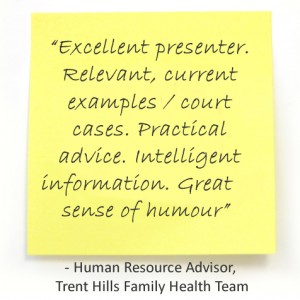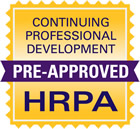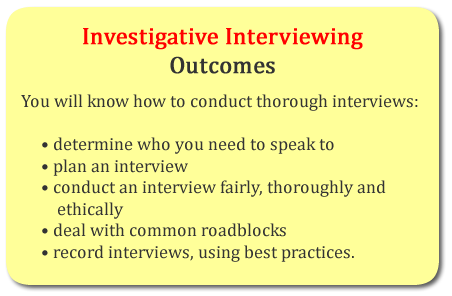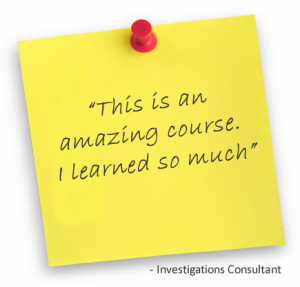Pick and choose ONE or MORE days, as you please!
January 16,17,18,19, 2017 Ottawa
February 27-28, March 1-2, 2017 Regina
April 4,5,6,7, 2017 Toronto
April 24,25,26,27, 2017 Halifax
May 15,16,17,18, 2017 Edmonton
May 29,30,31, June 1, 2017 Victoria
June 12,13,14,15, 2017 Vancouver
September 18,19,20,21, 2017 Calgary
PROMO ALERT!!!
$100 OFF per course!
Only until October 1, 2016.
We are very pleased to offer a course on how to conduct investigations that we think covers virtually all of the bases. We have divided it into four days – and you can mix and match as you please.
Day One is an overview of the fundamentals of investigation, covering everything from planning to report writing. It has segments on the building blocks of investigative interviewing, gathering digital and documentary evidence, as well as how to assess evidence. We use a lot of case studies throughout the day.
February 27, 2017 – Regina
April 6, 2017 – Toronto
April 24, 2017 – Halifax
May 15, 2017 – Edmonton
May 29, 2017 – Victoria
June 12, 2017 – Vancouver
September 18, 2017 – Calgary
Price: $495 $395 + TAX
Day Two is dedicated to investigative interviewing. The course expands on the principles of interviewing covered in day one, with much more in-depth material, including scenarios based on real life cases. Lots of participation and exercises – but no role-plays – guaranteed!

INVESTIGATIVE INTERVIEWING
![]()
January 17, 2017 – Ottawa
February 28, 2017 – Regina
April 7, 2017 – Toronto
April 25, 2017 – Halifax
May 16, 2017 – Edmonton
May 30, 2017 – Victoria
June 13, 2017 – Vancouver
September 19, 2017 – Calgary
Price: $495 $395 + TAX
Day Three is a brand new course – How to Use the Internet as an Investigative Tool Part 1 The World Beyond Social Media. This course introduces you to the proper techniques to navigate and recover information from the World Wide Web, beyond those discussed the previous day.
HOW TO USE THE INTERNET AS AN INVESTIGATIVE AND RESEARCH TOOL: PART 1 THE WORLD BEYOND SOCIAL MEDIA
![]()
January 18, 2017 – Ottawa
March 1, 2017 – Regina
April 4, 2017 – Toronto
April 26, 2017 – Halifax
May 17, 2017 – Edmonton
May 31, 2017 – Victoria
June 14, 2017 – Vancouver
September 20, 2017 – Calgary
Price: $595 $495 + TAX
Day Four is also a brand new course – How to Use the Internet as an Investigative Tool focusing on using social media such as LinkedIn, YouTube, Twitter and Facebook and other social websites to find information.
HOW TO USE THE INTERNET AS AN INVESTIGATIVE AND RESEARCH TOOL: PART 2 SOCIAL MEDIA
![]()
January 19, 2017 – Ottawa
March 2, 2017 – Regina
April 5, 2017 – Toronto
April 27, 2017 – Halifax
May 18, 2017 – Edmonton
June 1, 2017 – Victoria
June 15, 2017 – Vancouver
September 21, 2017 – Calgary
Price: $595 $495 + TAX
Pick one or more days, as you please
Just interested in interviewing? Then sign up for Day Two. Want to cover the Fundamentals of Investigation and also learn how to use the Internet as an investigative tool through social media? Register for Day One and Day Three.
Take all four courses and save!
Contact us about discounts for groups
Who should attend?
The course is designed to give anyone responsible for conducting, supervising or reviewing investigations or fact-finding of any kind, the tools required to ensure that they are done objectively, ethically and thoroughly. Previous participants have come from virtually every type of investigative area, including:
- Workplace / Human Resources
- Regulatory / Compliance
- Professional Conduct
- Healthcare
- Child / vulnerable person protection
- Audits
- Law enforcement
- Inspections
- Insurance
- Labour relations
- Health and Safety
- Security/Loss Prevention
- Human Rights/Ethics/Integrity
- Administrative Fairness
 Participants in previous courses have come from the private sector, government at all levels, academia, healthcare, regulators and compliance folks of all kinds and many other areas. Check out the testimonials on our website to see the variety of people who have attended – and found the courses useful, relevant, practical and fun.
Participants in previous courses have come from the private sector, government at all levels, academia, healthcare, regulators and compliance folks of all kinds and many other areas. Check out the testimonials on our website to see the variety of people who have attended – and found the courses useful, relevant, practical and fun.
Day 1: How To Investigate: The Fundamentals Of Effective Fact-Finding
This course covers the principles of excellent investigation; how to identify issues and then plan an investigation; how to conduct thorough witness interviews – even if the witness is hostile or difficult; how to deal with whistleblowers, how to gather, organize and review physical, digital and documentary evidence; using the Internet as an investigative tool, how to assess evidence and how to write clear and convincing reports.The course uses real life examples, with targeted case studies and recent court / tribunal cases. A great refresher for those already involved in investigations, as well as a comprehensive introduction into the world of investigations to those with little or no prior experience. The course will give anyone the confidence and capabilities necessary to conduct, monitor or supervise an investigation.The course includes discussions on the importance of ethics in planning and conducting investigations.Section 1: The Fundamentals of Investigation
- The eight principles that apply to any kind of investigation
- An assessment tool for determining the quality of your own – or someone else’s – investigation
- Procedural fairness
Section 2: How To Plan An Investigation
- Road-mapping the investigation
- Identifying the issues
- Pinpointing what and where the evidence is
- Setting timelines
Participants are provided with an investigation-planning template that can be easily adapted to whatever type of investigation they do. Section 3: Investigative InterviewingThis segment covers the basic building blocks of good interviewing practice.
- The six fundamentals of interviewing
- The twelve stages of an interview
- Common problems that arise with witnesses and how to deal with them
- Assessing credibility
- Dealing with difficult witnesses
- How to record interviews
Section 4: Documents and Digital Evidence
- How to identify, organize and review documents
- Documenting your investigation
- Dealing with digital evidence
Section 5: Evidence Assessment and Effective Report Writing
- Admissibility, sufficiency, credibility, relevance
- Narrative reports
- How to set out your analysis clearly and comprehensively
- A structured approach to making report writing as painless as possible
- Formulating conclusions and recommendations
Section 6: Wrap-Up and Evaluations
Day 2: Investigative Interviewing
Good investigators are usually good interviewers.
Speaking to people who have evidence relevant to whatever it is you are investigating is a very important part of most investigations. You have to know how to ask the right person the right questions, in the right way, at the right time and in the right place.
This course offers a structured approach to getting information from an interviewee as effectively and efficiently as possible, with a focus on interviewing in any investigative context – both formal and informal. We cover methodologies for ensuring that you obtain all the information that any party has that may be relevant to your investigation, including from reluctant and evasive witnesses.
We discuss how to identify who you need to speak to, decide whether or not an interview is necessary, the general principles that underpin every good interview, how to put the interviewee at ease, how to structure the interview itself and best practices in recording the interview.
The course is hands-on and interactive as possible. It includes several group exercises and video footage of interviews done well – and not so well.
We use a scenario throughout the day. It is based on a real life incident, with video footage of the incident being investigated. Participants are divided into small groups to brainstorm their ideas for preparing and conducting interviews of people involved in the incident, and to develop solutions to the challenges that the scenario presents. We then go through what actually happened. It’s a very effective learning tool. No role-plays – other than by the instructor.
Syllabus:
Introduction To Interviewing
Interviewing And Interrogations – Similarities And Differences
The 3 Stages Of The Interviewing Process
- Identify
- Decide
- Interview
The 6 Principles Of Effective Interviewing
A detailed discussion that covers preparation, building a rapport, thoroughness, objectivity, keeping control of the process and actively listening.
Preparing For The Interview
- Knowing the issues and the interviewee
- To Google or not to Google? What is out there on the Internet.
- Questions or question areas?
Setting Up The Interview
- Making contact
- Choosing a location
- Confidentiality concerns
Whistleblowers
Ethical Considerations
- Integrity and fairness
- Dealing with vulnerable witnesses
- How far do you go?
- Tricks of the trade
- How to avoid getting duped
Types Of Interview
- Face to face
- Telephone
- Written Interrogatories
- Skype
How To Structure An Interview
- The twelve stages of the actual interview
- Do’s and don’ts, as the interview progresses
- Dealing with evasive witnesses
Recording Interviews
- Best practices
- How and why
Participants will be provided with a draft digital voice recording policy that they can adapt as they see fit.Interviewing Techniques
- PEACE
- Cognitive interviewing
- Reid Technique
Assessing Credibility
- Body language
- Behavioural analysis
- SCAN
Common Roadblocks And How To Deal With Them
Mistakes Interviewers Make
Assessing The Success Of An Interview
- A checklist to assess the quality of an interview
Creating Interviewing Policies
Wrap-up and Evaluation
Day 3: Using the Internet as an Investigative and Research Tool: Part 1 – The World Beyond Social Media
This course introduces you to the proper techniques to navigate and recover information from the World Wide Web, beyond those discussed the previous day.
Search Techniques and Methodology
Content includes how to search the web smartly and strategically. We cover the most effective and fruitful approaches and set out a proven methodology, using search strategies with web-based tools.
Search Engines and Directories
This session teaches you how to use the most popular web searching tools to your advantage. We discuss the world beyond Google – those more obscure tools that may be the key to finding information relevant to your investigation – from reverse search engines to public databases that contain a cornucopia of information – if you know where and how to look.
Recovering Lost Sites
This session deals with the recovery of sites no longer operating, from the numerous major online archives and various tools that cache data. We cover how to think strategically when leveraging data, with online exercises to reinforce the lessons learned.
Web Names (Domains)
This session explains the structure of site names, how they are registered and what information on the registrations is in the public realm. Additional material focuses on how to identify other sites on the same host computer IP number, finding additional related sites to targets through thought process and online tools that allow person and entity name searches for web site registrations.
Invisible Web
This session covers how to access and recover data from online data bases located across the world. Included is a list of links to gateways of high-quality databases. We address privacy concerns and ethics. We also provide an overview of business, corporate and property registrations systems.
Day 4: How To Use The Internet As An Investigative and Research Tool: Part 2 Social Media
These are truly great courses – and a lot of fun, too.
There is a lot of information on the Internet that potentially may be relevant to your investigation – whatever kind of investigation you do. The Internet has vastly increased the quantity and breadth of information available to investigators. It has made research much faster and easier. It can help identify possible witnesses. It can provide background information about those involved in an investigation. It may provide video or photographic evidence of what happened. Tweets, blogs and posted comments may shed light on something under investigation.
These courses teach how to access that information – efficiently and ethically using Open Source Intelligence (OSINT).
The courses are very much hands-on, full of practical exercises and lots of take away information sheets. We provide the computers and a very highly regarded and experienced instructor. If the experience of participants on previous courses is anything to go by, you will be amazed by what you learn. Spaces are limited.
We have divided the courses into day three and day four. The day three focuses on social media. The day four covers the broader Internet, including how to find information smartly and strategically. Register separately for each course. You can mix and match – pick one day from How to Use the Internet as an Investigative Tool and combine with the Fundamentals of Investigation course ( Feb 22nd) and/or the Investigative Interviewing course ( Feb 23rd) that we are putting on just before this course day – or take them all!
Here’s what we will cover:
Twitter, Facebook, LinkedIn, YouTube– and many more. Social media contain a wealth of information that might be of use to you – if you know how and where to look for it. This full-day course will cover how to use Internet social networks to further your investigation. We will cover:
- how to use search tools associated with social media
- strategic search tools for finding people,
- how to find information on social media, including specialized searches on tracking postings and photo searching
- A session on searching to identify individuals associated with an e-mail address.
This is an exercise-based course – with practical examples and techniques that will have you digging deeper into the Internet as the day goes on. The course will give you the skills to mine social media networks for information relevant to your investigation – effectively, legally and ethically.
You will be on-line throughout the day on both Internet days, learning the techniques by actually doing them. It’s proactive, practical and fun.
Instructors
Gareth Jones is a former Director of major investigations at the Department of National Defense and Canadian Forces (DND/CF) Ombudsman’s Office. Prior to that he was an investigator with the Attorney General of the Province of Ontario, Special Investigations Unit (SIU). He conducted many workplace investigations as a senior manager.
Gareth has delivered investigative training courses for organizations across Canada and the world. He has created customized investigations courses for many public and private sector organizations, including Department of Justice War Crimes, Vancouver Coastal Health and the CBSA, as well as specialist workplace and harassment investigations courses, including for Exxon Mobil and the Public Service Commission of Canada.
He has provided training to many regulatory and oversight bodies, including the Law Society of Upper Canada, the Office of the Information Commissioner of Canada, the Ontario College of Teachers, IIROC, the Nova Scotia Department of Labour and Advanced Education and the BC Ministry of Health.
Gareth is the author of Conducting Administrative, Oversight and Ombudsman Investigations, published by Carswell in 2009, and Undertaking Effective Investigations: A Guide for National Human Rights Institutions, published by the Asia Pacific Forum in 2013. He is a former police sergeant with the Metropolitan Police, London, UK.
Andy Phillips was a member of the Royal Canadian Mounted Police (RCMP) for twenty-five years, over 20 years of which was spent investigating financial crimes He retired from the RCMP in 1997 and spent two years working within the banking and insurance industry,
Andy’s focus since 1999 has been the Internet and its use for investigations. In September 2008 he set up his own consulting business and now works and consults for various Federal and Provincial government agencies in Canada. He has testified in court in respect of evidence from the Internet, and in 2009 was qualified as an expert on Internet Open Source Collection in General Division Court in Montreal in a national security matter.
Andy has created and delivered courses on using the Internet as an investigative tool to administrative investigative agencies, regulators and law enforcement in Canada, the United States, Europe, the Middle East, Africa, Southeast Asia, Australia and Latin America.
Ian Scott
Ian Scott is a graduate of the University of Toronto and University of Western Ontario Law School, and was called to the bar in 1983. After conducting research for Judges of the former High Court of Justice, he worked briefly at a downtown law firm, and joined the Criminal Law Division of the Ministry of the Attorney General in 1985. He has held numerous positions in that Division, including Chief Counsel – Justice Prosecutions, General Counsel, appellate counsel and head of the office’s criminal trials unit. He has also spent time in private practice, where he represented police management in police disciplinary hearings, and appeals to the Ontario Civilian Commission on Police Services and Divisional Court. In October 2008, he began a five year term as Director of Ontario’s Special Investigations Unit, a position which ended in October 2013. He is currently in private practice.
He is the editor of Issues in Civilian Oversight of Policing in Canada,published by Canada Law Book in 2014. As well, he is the author of the Police Services Act of Ontario: an Annotated Guide (3 ed), and the co-author ofSalhany’s Police Manual of Arrest, Seizure & Interrogation (10th ed). An eleventh edition will be published later this year.
Ian is adjunct professor at Western Law School teaching criminal procedure and a new course called ‘Police Accountability and the Law’. He is investigative counsel for the Justice of the Peace Review Council and the Ontario Judicial Council.
He is also a member of the Ontario Review Board.
When Ian was director of the SIU he reviewed over one thousand investigations of police officers involved in death, sexual assault and serious injury incidents.
